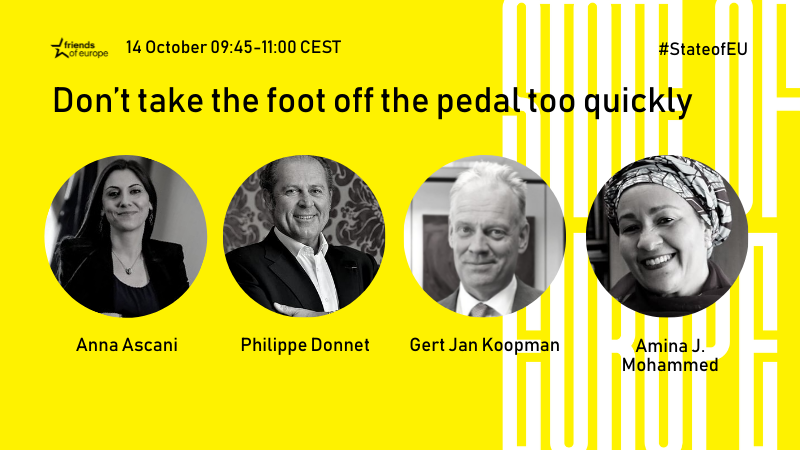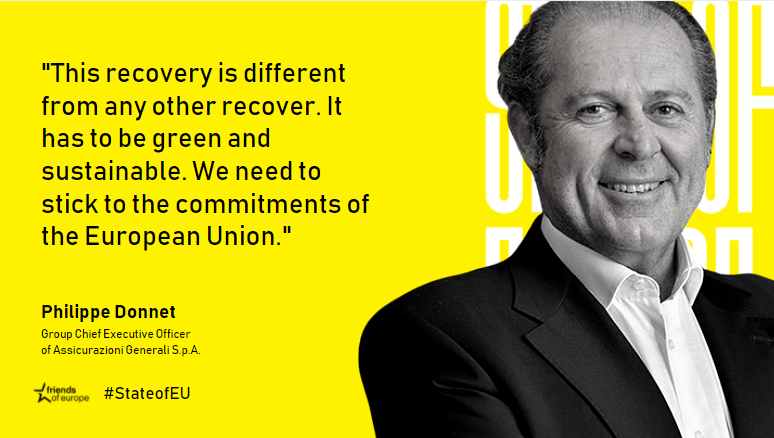GCEO Philippe Donnet at the State of Europe 2021 festival
14 October 2021
The Group CEO of Assicurazioni Generali S.p.A. Philippe Donnet took part in a panel titled “Don’t take the foot off the pedal too quickly,” discussing the post Covid-19 European economic recovery, the challenge to find alternative investments and the urgency in tackling the climate change for citizens and insurance companies.

THE ECONOMIC RECOVERY
Recovery must be green and sustainable. We need to stick to the commitment of the European Union. There will be no recovery if this is not sustainable, there will be no recovery without cooperation at all levels. When we look at the challenges we are facing - pandemics, cyber risk, climate change and terrorism - they are all global challenges: there are no local solutions to global risks and challenges. Public-private partnerships will be part of the solution. For example, we must be better prepared to face the next pandemic, we must find solutions to better protect SMEs that have had to suffer a lot due to business interruption. By working together in a public-private partnership, insurers and reinsurers, member states and European institutions, we can truly build viable solutions to better protect SMEs.
When it comes to investing in the sustainable recovery, we need private investors and capital. Our sector, in Europe, manages assets worth € 11 trillion, which can be invested in the green and digital recovery. There are two conditions to do this: we need to invest together and have an appropriate regulatory framework.
Green bonds, for example, are a good asset to invest in: we need green bonds and as insurance companies we want to invest in them, but the regulatory framework, Solvency II, must be consistent with this. As Generali, we asked the European regulator to make green bonds a specific asset class to lower the cost of capital. Public-private partnerships can allow us to invest more and more quickly, in line with these objectives, but it is also important to have an adequate and consistent regulatory framework with respect to this.

HOW TO INVEST
I am confident that the recovery will be strong, especially in Europe, because the right conditions are being created for a green and digital recovery. However, there are some risks: inflation, commodity prices, disruption of the global supply chain, shortage of materials and shortage of workforce in some sectors. We need to seriously address this issue, because there will be no sustainable recovery if people do not return to work in all sectors.
We need to focus on what's really important. We need to invest in low or zero carbon assets. Our industry is committed to reducing carbon emissions to zero by 2050 (Net Zero Insurance Alliance) and we need to invest in infrastructure, green hydrogen, sustainable bioenergy, education, digitization, innovation and healthcare. The world needs it, and we as insurers need it too, to provide our customers with this premium. There is a convergence of interests between the needs of the real economy and those of insurance companies, and regulation needs to help and support this convergence.
REGULATION
As insurers we need to find alternative investments, as interest rates are low. We can therefore no longer invest only in government bonds, we need to diversify. This does not mean that we must look at riskier investments: it is not a question of taking more risks but of investing in the real economy through SMEs, infrastructure, the real estate sector. Investment in the real economy is not more risky, and should not suffer from a regulatory standpoint from too high capital risk. Less liquid investments do not mean they are more risky. The regulation does not take this into account, and it would be important for it to do so to really help us accelerate our investments in the green, sustainable and real economy.
CLIMATE CHANGE
We have seen a significant increase in the frequency and intensity of natural disasters and this comes from climate change. We need to stop it, as soon as possible. If we do not stop it, these types of risk will not be insurable anymore. Technically speaking, this is a risk that concerns reinsurance companies more than insurance companies, but if the reinsurance sector were to no longer be able to face this risk anymore, insurance companies would have to significantly increase prices and we would not be able to insure people. There is urgency in tackling the climate issue and this is why the insurance sector took action for net zero carbon emissions by 2050.


